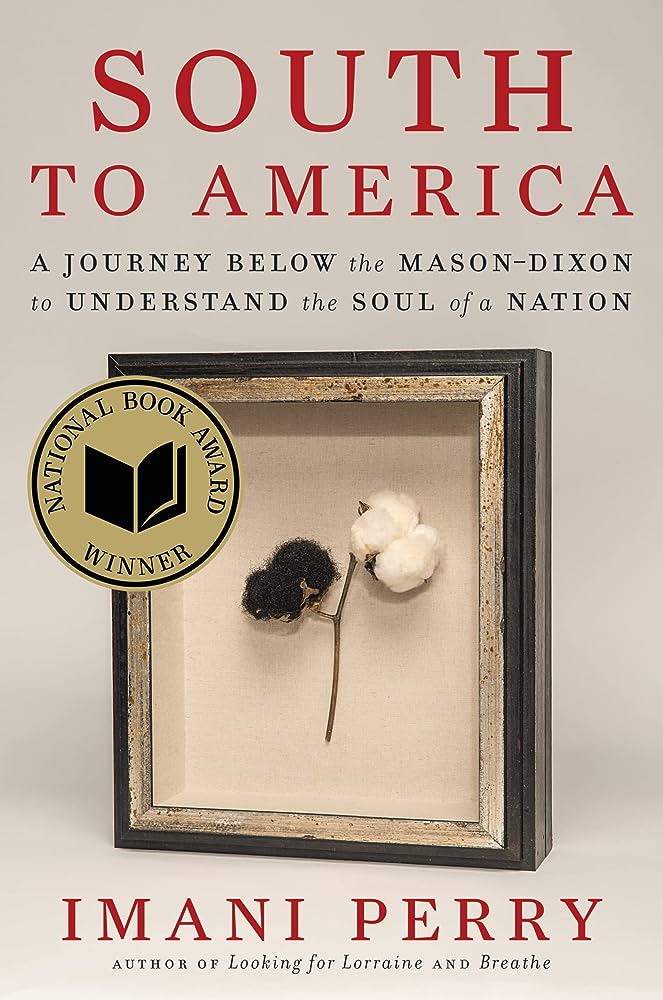Or Dolly Parton, an honest-to-God multimillionaire who grew up a poor mountain woman. She says, “It takes a lot of money to look this cheap,” and stays so garishly adorned that she has no trouble going unrecognized when she isn’t “dolled” up.
==========
Jefferson admittedly gets more scrutiny than some of his peers, like Madison and Washington, when it comes to matters of race and status. This is largely because it is well established that he held his children born to Sally Hemings, his slave who was thirty years his junior, as slaves as well. (And yet there are people who still want to argue that the relationship might have been consensual.)
==========
It was a theatrical repetition of Gil Scott-Heron’s pointed phrase “A rat done bit my sister Nell with whitey on the moon.”
==========
As Albert Murray said, “American culture, even in its most rigidly segregated precincts, is patently and irrevocably composite . . . the so-called black and so-called white people of the United States resemble nobody else in the world so much as they resemble each other.”
==========
Though segregation remains (as the saying goes, Sunday morning is the most segregated time in the United States), much continues to bind its parishioners.
==========
Atlanta is over 50 percent Black, it is luminous with Black celebrity and iconography, but the unbearable Whiteness of its being—and by that I mean a very old social order grown up from plantation economies into global corporations—still leaves most Black Atlantans vulnerable. No matter how it might look, Atlanta still comes out white as snow.
==========
And James Baldwin, who kept returning to the South to find himself and his country, described the period in The Evidence of Things Not Seen. The book is an exemplum of being shattered, by death, by Reaganism, by the dashed hope of freedom in the moment. Like Bambara, he is skeptical of that which is taken as prima facie truth about what was going on, in Atlanta and elsewhere. One of his lines, among many, still resonates loudly: It is a very grave matter to be forced to imitate a people for whom you know—which is the price of your performance and survival—you do not exist. It is hard to imitate a people whose existence appears, mainly, to be made tolerable by their bottomless gratitude that they are not, thank heaven, you.
==========
When decrying Black protests against police brutality, T.I. referred to Atlanta as a real-life Wakanda, a place “we” shouldn’t tear up because it is ours.
==========
Ask any Black student at Princeton or Black students at any peer institution the same, and the odds are quite good that the celebration of their admission was diminished by a claim of unearned benefit. “Affirmative action” is said with a sneer. It is a straw man of the right wing. Because of course college admissions are not an exercise in fairness, no matter what the brochures claim. They are a product of all sorts of inequality. It is not as though labor and talent are inconsequential; it is just that they don’t count for nearly as much as opportunity. But let’s stay for a moment with the potential complaint of the man who was working the vending machine while I was flying back from teaching a class at Vanderbilt to my regular life as a faculty member at Princeton. Because the fact is that he does have a meaningful claim against the nation; the problem is that the claim is misdirected when it comes to me.
==========
W. E. B. Du Bois taught us this, and we teach it to our students. Whiteness was offered as a promise. Precarity makes it less sturdy. There are White people who work hard all of their lives and Whiteness gives them little materially. On the other hand, there are White people who come from powerful edifices, who can point to paintings on Vanderbilt’s or Princeton’s walls and see their genealogies. Individuals like me, the descendants of those who cleaned the toilets who happened to make their way into the classrooms, are distorted images of some remarkable transformation, but in truth we are the exception that solidifies the rule. We have departed, taking pearls with us, but Nashville’s Black people remain largely poor.
==========
The stretch of I-40 between the Nashville and Memphis is called the Music Highway, and that road tells a story. Nashville is country, whereas Memphis is where the Rock & Roll Hall of Fame should have been, as it is the home of the music that was birthed by the blues. But Memphis was and is poorer than the city that won that distinction, and now Blacker than the classic American form that came from Black people. Doesn’t change what it was and is.
==========
When I was coming up, in part because of Public Enemy, specifically Chuck D’s words, “Elvis was a hero to most, but he never meant shit to me. Straight up racist, the sucker was simple and plain, motherfuck him and John Wayne,” Elvis was a subject of scorn for Black people. And even though Jet magazine announced that he’d never said, “The only thing a black person can do for me is clean my blue suede shoes,” the rumor persisted. Rumors, even when not based in fact, are often based in truth. This one reflected the economy of race and entertainment, and the history of the way they were intertwined. Elvis, the man they called the King, somewhat erroneously, knew what was happening with him. When asked about his popularity, he would say he was an apprentice to Black musicians. He knew why he could get what they didn’t.
==========
An effort to place Elvis more accurately in history doesn’t just require a recognition that he saw his indebtedness to Black musicians. It also means thinking about how he stands in the American imagination above Black musicians who were his forebearers and peers. Now and again, popular media will point out Big Mama Thornton, Sister Rosetta Tharpe, Chuck Berry, and the most famous among them, Little Richard, as masters of the form of which Elvis was deemed King. And music critics will continue to restore them to their rightful place in history. But there’s something to be understood just in noting the difference. Even with his poverty, even considering how he was an outsider, Jim Crow logic created a different trajectory for Elvis.
==========
And that phenomenon is now built in our popular culture, even with the progressive erosion of a color line in music. For example, Justin Timberlake, a Memphis native whose style is deeply rooted in the traditions of the Black South, does nothing quite as well as Usher (from Chattanooga) in terms of song and dance, and yet Timberlake is tens of millions of dollars wealthier.
==========
Little Richard reminded everyone, during his life, of the indignity he was forced to endure in comparison to Elvis. Never granted his rightful place in the history of rock and roll, he resented Elvis and he told the world about it, too.
==========
The prevalence of “Lil” and “Baby” as prefixes throughout hip hop tells you something about Black language, especially as rendered in the South. You are defined by your relationships, by your people. To be a “lil” version means there was an elder to whom you belonged, from whom you learned. There’s a history in your name, and an honesty about your apprenticeship. That said, in the world of popular culture, it appears to also suggest an eternal adolescence, a role-playing immaturity sustained for the amusement of audiences.
==========
The use of the great river to fill coffers and steal lives has been the American way for a long time. You could anticipate it, the way Mark Twain reflected on the vice and greed, as well as the science and beauty. He wrote about the riverboats that brought one to Memphis as exempla of the spirit of the city, a drink-induced social order: How solemn and beautiful is the thought, that the earliest pioneer of civilization, the van-leader of civilization, is never the steamboat, never the railroad, never the newspaper, never the Sabbath-school, never the missionary—but always whiskey! Such is the case. Look history over; you will see. The missionary comes after the whiskey—I mean he arrives after the whiskey has arrived; next comes the poor immigrant, with ax and hoe and rifle; next, the trader; next, the miscellaneous rush; next, the gambler, the desperado, the highwayman, and all their kindred in sin of both sexes; and next, the smart chap who has bought up an old grant that covers all the land; this brings the lawyer tribe; the vigilance committee brings the undertaker. All these interests bring the newspaper; the newspaper starts politics and a railroad; all hands turn to and build a church and a jail.
==========
Still, real estate brokers sell working farms as “plantations.” I suppose it gives some buyers a rush, a delightful turn in the past. It turns my stomach. The brokers will describe the vastness of both the home and the empty space around it. They promise things like: “This one has it all, luxury, beauty, recreation, fishing, hunting, guest quarters, timber. You name it and it’s here. The only way you are going to understand this property is to take a look for yourself. Paradise . . .” All that is missing is us.
==========
We haven’t outrun or outlived the plantation, although it looks a little bit different. Now the fugitives are from Central America, and the unfree laborers are in prison. Some kids are still hungry, even so many years after the breakfast programs and Head Start and all of the gains fought for by Black elected officials, because the gag is in the money and the land, and it still isn’t free. There’s an honesty to Mississippi about all of this. The triumph is not in ends; it is in the fact that we are still here.
==========
Walter was born in Savannah, but raised partly in Beaufort, South Carolina, which, he asserts, is the most beautiful city in the United States. I wouldn’t argue with him on that.
==========
One of the difficult side effects of desegregation—and you’ll hear it again and again from Black people who lived in the before time—is that something precious escaped through society’s opened doors. Even acknowledging how important desegregation was, the persistence of American racism alongside the loss of the tight-knit Black world does make one wonder. What if we had held on to those tight networks ever more closely, rather than seeking our fortune in the larger White world that wouldn’t ever fully welcome us beyond one or two at a time? Such reflection often leads to a sorrowful place, though not what I would call regret. Black folk knew they had to push the society to open its doors. They just didn’t know how much it was going to cost.
==========
The South is a monster of a place that one cannot help but at least partially revile. And everybody knows it, no matter how much they might glory in neo-Confederacy. The Janus face of Southern Whiteness—they know what they’ve done wrong, and they know you know; they hate you for it, and hate themselves for it, too—is strange.
==========
Eatonville was the first incorporated Black town in the United States. It was established in 1887 by freedpeople who, through collective purchases, established and advertised their town as a place of possibility for African Americans. They built wood-frame houses, schools, and a municipal government. It provided a refuge from the violence just outside their borders. Orange County, in which it sits, was once the center of racial violence in the South. Florida had the highest per capita rate of lynching in the South, and Orange County had the highest number of lynchings in the state between 1877 and 1950. You can understand why Eatonville was precious to its daughter.
==========
Dollar stores are a bonanza for candy, sponges, party favors, plastic tablecloths, and some cleaning supplies routinely offered in both Spanish and English. There’s a willful disorder, again to produce the bargain effect. If there are White people in them, they’re often the White people who other White people put down or mock. They have twangs or drawls or heavy local idiosyncrasies in their speech that remind you that White folks do indeed have a lot of culture when they don’t run away from it for the faceless bounty of being simply “White.” The washrags and towels are rough, precisely how I prefer them to be. Roughness cleans you, your children, and your household items better than thick, lush things. I hate a soft “washcloth.”
==========
The military is central to Southern culture. Southerners are most likely to enlist. Southern presidents are more likely to wage war. The martial orientation is generally agreed to be an outgrowth of the aristocratic culture of honor among the planter class. It is intensely patriarchal and tends towards authoritarian ways. But the militarism is also an everyman and everyday sort of thing.
==========
While the South lost the Civil War technically, White Southerners did not in fact lose the war substantively. After all, Jim Crow, convict labor, and lynching happened with near total impunity, and African Americans experienced decades of pernicious neglect from the federal courts and government. Exploitation ran amok. Inequality persists.
==========
The way private enterprise took over the grounds of public housing and Black life in New Orleans is consistent with the norms of late capitalism in the United States. Everything is subject to markets. Folkways have little power without capital. But there is a particularly sharp way gentrification cuts in the South, a region built by the people who were property. People who in freedom saw their perceived value plummet. It is worse than irony. It is devastation.
==========
In 1818, Great Britain declared that all enslaved Africans who set foot in the Bahamas would be manumitted. This fact attracted Black people from across the Atlantic world.
==========
The nation also profited during Prohibition in the United States, sneaking rum to the nearby US coast. Being so close, yet outside the purview of American law, has been a source of Bahamian prosperity in one way or another for generations, particularly for those seeking to protect profit from taxation.
==========
It is one of the tragic ironies of global history that Haitians, the people of the first independent Black republic, the nation that inspired the Black world to fight for freedom, are so frequently treated as belonging at the bottom of social hierarchies in American nations. But it is precisely because Haiti has always been made to pay for being free. Their national debt, and recurrent economic suffering, began in the demand that they repay France for its loss of a profitable slave society. They were punished with military occupation and dominion that impoverished Haiti and Haitians. They are punished by disdain when they seek refuge in other nations. This reality became extremely clear in 2019 after Hurricane Dorian ravaged so much of the island nation. On Great Abaco Island, the shack-like dwellings populated by Haitian Bahamians were left in ruins.
==========
It is like Jamaica Kincaid said: That the native does not like the tourist is not hard to explain. For every native of every place is a potential tourist, and every tourist is a native of somewhere. Every native everywhere lives a life of overwhelming and crushing banality and boredom and desperation and depression, and every deed, good and bad, is an attempt to forget this. Every native would like to find a way out, every native would like a rest, every native would like a tour. But some natives—most natives in the world—cannot go anywhere.
==========
Cuba is Black. And everywhere I was assumed to be Cuban. Despite the fact that John Muir, the conservationist who trekked down the Appalachian train to the Gulf Coast and finally stopped at Cuba, said that Cuba had the ugliest and physically strongest Negroes he had ever seen (signaling his own ugly ways), I found little physical distinction between the people of Cuba and the Black folks in the South beyond sartorial style. Black Americans often dress wearing traditional tourist styles (big shorts, boxy tops, fanny packs, visors, etc.) when abroad, I’ve noticed, perhaps because we are deeply American, and perhaps to signal that Americanness.




